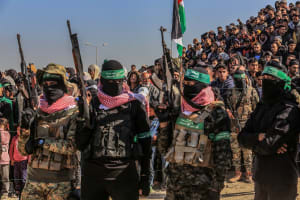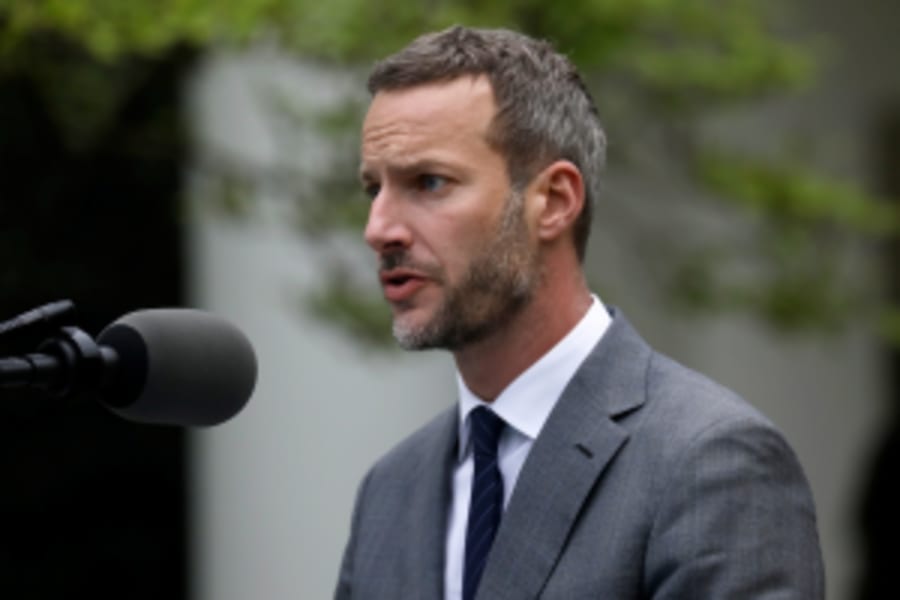In-depth: Oct. 7 survivors are on a mission to wake up the world to the barbarity of Jew-hatred

Adolf Eichmann, a key architect of the Nazis’ “final solution,” in 1961 faced trial in Jerusalem after being captured by the Israeli Mossad hiding in Argentina. The televised trial was the first time holocaust victims were able to speak directly to the world about the horror they had faced.
These testimonies had an immeasurable impact on public opinion and further brought to light the barbarity of Jew hatred.
Antisemitism, however, didn’t die with Hitler. Nor did it die after Eichmann’s execution.
On October 7th, the Jews faced the worst massacre since the Holocaust. The perpetrators’ genocidal intentions were clear and well-documented. Yet, it didn’t take long before the horrified gasps of the world turned into victim blaming and global antisemitism. The Jew hatred spanned college campuses, city streets, and, sadly, even some church pulpits.
It is for that reason that many Israelis who survived the massacre on October 7th are on a mission to travel abroad and draw on the heart-changing influence of personal testimonies.
I attended one such event organized by the World Zionist Organization at the Jewish Community Centre (JCC) in London, Ontario, last Sunday, where survivors Asaf Artel and David Bromberg shared their powerful stories.
Asaf Artel
The first speaker was Asaf Artel, 52, who is the community manager of his Kibbutz in southern Israel, Kissufim, which had a population of 800 people prior to the Hamas attack.
Eighteen individuals from Kissufim, which sits a mere 700 meters from the Gaza border, were killed in the attack, while the rest have been displaced since their evacuation nearly eight months ago on October 7th. The beautiful agricultural community was also home to Shlomo Mantzur, an 85-year-old Holocaust survivor who is the oldest Israeli hostage remaining in Hamas captivity in Gaza.
As a community manager for the last 20 years, Asaf’s responsibilities include the welfare of the people in the Kibbutz and the securing of all infrastructure. On the 7th of October, Asaf led an intense evacuation, going safe room by safe room to rescue families from the barbaric rampage ripping its way through Kissufim.
In his speech on Sunday, Asaf began by highlighting the great joy and care put into his community, and how safe the families felt despite the proximity to Gaza and the rocket attacks launched all too commonly upon the people of Southern Israel.
“The whole area was a very beautiful place,” he said, referencing pictures of its farmland. “We put a lot of energy into making our life happy, although it’s very close to the border. Everybody can walk freely, young people [and] young kids can play [everywhere]. The appearance of our community was amazing—green and flowering. That’s enormous [because] it’s the north part of ‘the naked desert.'”
At 6:29 on October 7th, an attack began, the scope of which no one could have imagined. It wasn’t long after the red alerts went off before Asaf knew this was not simply another rocket attack. He began hearing shouting and screaming over the radio about terrorists with guns driving between houses and hearing thousands of explosions overhead of the Iron Dome intercepting missiles mid-air.
“When I realized my family are in the safe room, and they are safe now, it’s time for me to take care of the community. I have a responsibility,” he described.
After securing his family in their safe room, he grabbed his radio, gun, and two magazines, about 30 rounds, and left his home.
“I think 10 minutes after, I was out of ammo,” Asaf recalled.
Seventy terrorists entered Kissufim from three separate directions, he explained, “They were very well trained. They had very good intelligence. They know exactly where they are going.”
The Hamas terrorists first came to the apartment of the Kibbutz Sheriff, locking him inside his safe room where he would be trapped for the next ten hours.
Despite Hamas severing electricity and communications, Asaf was able to contact the army.
“I told them, ‘Listen, we have terrorists inside the Kibbutz. They’re fighting and shooting all over. Please send troops.’ She said there was a very big force on the way to assist, ‘please hang on,'” he described. “After half an hour, when nobody showed up, I called again. She said, ‘The platoon is on the way. We are about seven kilometers away. They are doing their best to arrive as fast as they can, but there is fighting on their way to your place. It might take a while. Please hang on.'”
“Another hour passed,” Asaf continued. “Nobody showed up. I called again around 10:30 in the morning, and she said they were not going to show up. ‘They’ve been ambushed, and they can’t break through. You have to take care of yourself.'”
Those words rang in Asaf’s ears, “We all remember what happened in the Yom Kippur War and what happened in the Suez Canal. [On the anniversary of the Yom Kippur War], we kept saying, How could it happen? We are the strongest army in the world. It will never happen again. But then, at 11 o’clock in the morning, I heard the same message, ‘Nobody will show up. Take care of yourself. You’re on your own.'”
“I decided I’m not gonna pass that message down to the people,” he said. “The next time I called that army command post in the afternoon, nobody answered. In the evening, I realized nobody answered because the terrorists broke in and killed them all.”
The Kibbutz’s Emergency Support Team, who were few in number, were still working to fight off the terrorists. Asaf was able to contact another army unit nearby and ask them to join in the fight. The unit and support team were able to kill 30-40 terrorists, with most of the remaining fleeing back to Gaza. Then, the evacuation plan went into action.
“We had an evacuation plan in advance, but it wasn’t that easy. We had to move from one safe room to another, knock on the door, knock on the windows, and scream for the people inside to ask them to open the door,” he detailed, adding that many were reluctant, believing it to be a scam of Hamas. “Slowly, one by one, we managed to pull them out through the door or through the window, put them on [an] armed vehicle, and drive them away to a safe gathering point about 15 kilometers away.”
“During that morning, Hamas walked around, moved from one apartment to another. They threw grenades. They shot RPGs and heavy machine guns. They booby-trapped. They burned out almost everything,” Asaf explained. “It was Shabbat morning, so there were no kids in the [kindergarten]. The terrorists, they didn’t mind. They blew it up.”
Whole families were massacred, he lamented.
Since the attack, the residents of Kissufim remain in hotels by the Dead Sea, longing to return and rebuild.
“In about six weeks’ time, we will leave this hotel and go move into a temporary place right next to Beersheba for another two years. During that time, we will try to start to rebuild the Kibbutz,” Asaf said. “It’s quite easy to build a house; you just take bricks and concrete, and you build. But it’s not easy to rebuild trust or rebuild community. That will take time and a lot of effort, but I think we are a strong community.”
David Bromberg
The second speaker at the event was David Bromberg, 26, who survived the Nova music festival massacre by taking command amid the confusion and chaos to lead his fleeing group to cover.
Being friends with the individuals organizing the Nova festival, Bromberg received two free tickets and was enthusiastic, knowing many of the people who would be in attendance.
Similar large festivals had been paused from taking place in Israel since 2019, he explained. At 6:20 am on October 7th, David ran into someone he knew and joked, “I wonder what’s going to explode the party this time?”
“Five minutes later, missiles started coming in,” he described.
Due to the frequency of rocket attacks in the Gaza Envelope, festivalgoers were not initially panicked. “People are still kind of walking, filming, laughing—you know, just a normal day. Two minutes in, a policeman goes on the stage, shuts off the music, and says on the microphone, ‘Everyone, evacuate now.'”
David ran into another friend and took a video with him. That individual was Eliya Cohen, one of three Israeli hostages whose bloody abduction from the ‘death shelter’ was seen in newly released footage this week. “That was the last time I saw him,” David noted. “He’s kidnapped still today.”
As the situation at the festival grew more dire, it became clear that there was no safe place to hide, and the traffic leaving the festival was at a standstill. “4000 people trying to get out onto a one-lane road—[it was] chaos,” he stressed. “People getting in the car, getting out of the car, laying on the ground. Everyone is confused. No one knows what to do.”
Despite the traffic, David and his friend decided to get back into their vehicle. Shortly after, gunfire began. “We get to this curve, and then the machine gun sound started to hit—and I knew it was the beginning of war. Machine guns coming in non-stop with no break,” he described. “I had a machine gun in the army; that was my gun, and we were taught to use wisely our bullets, not to just shoot. So, you can hear when it’s our army or terrorists that are just shooting at everything.”
Their car arrived at a forked road, David continued, “We’re about to take a right and a car comes filled with bullets screaming, ‘Don’t go there! They are shooting at everyone!'” Later on, he learned that every car that had gone right was taken directly into an ambush.
Facing another jammed road and continuous sounds of gunfire, about 400-500 people took to the fields and began to run. With the fields in mid-October completely bare, the Hamas terrors were able to stay on the roads and pick fleeing people off one by one.
“By the second, the numbers are getting lower because we’re getting shot like ducks,” David stated. “[Bullets were] flying overheads; people are dropping dead.”
“I kept on trying to get orders from someone, expecting someone to spring up with what to do. No one was. There’s no army, no police. This kind of gave me a switch—gave me some kind of courage. I don’t know what it was,” he remembered. “I get up, and I scream, ‘Everybody, I was the commander in the army!’ I wasn’t a commander in the army. ‘I know where I’m going!’ I had no idea where. I could have said anything. People actually started following me.”
Bromberg directed the group to a bush-shaped tree a kilometer from the festival, where the group would hide for several hours amid the rampage. At 11:30 am, one of the gentlemen in the group was able to contact his father who lived over an hour away, David noted, “In a war zone, it’s a little bit longer.”
“Around 1:30, we hear things moving in the bushes, so we keep quiet until we hear someone screaming with an Arab accent in English. We immediately all lay low and cover our mouths. An [approximately] 45-year-old Palestinian from Gaza who invaded Israel found us. He asked me if I spoke English. I said, Yes. As I’m speaking to him another one comes in the tree, and another one, and another one.”
“We have 13 Palestinians from age maybe 14 to age 45 looking at us. Only the four guys are staying in the tree,” David recalled. “I see they don’t have any weapons. They wanted us to come with them. And, of course, we’re saying, ‘We’re not coming with you.'”
The group had seen social media posts saying Palestinian civilians had joined Hamas in entering Israel—they, too, were kidnapping, murdering, and raping Israelis. David pointed out to his group in Hebrew that the terrorists didn’t have weapons, and he readied to fight.
The Palestinians argued with one another about what to do, David described, “After two minutes, I tell them in Arabic, ‘Go, leave us alone. Now, police are coming. You don’t want to be here.’ They finally agreed to leave.”
With terrorists everywhere, the group stayed in the tree for several more hours until the father of one of the men in the group was able to rescue them. As he comes, David sees a police car pull up, “You have to get out of here. The terrorists are 100 meters away.”
“We already hear the ‘Allah Akbars’ coming closer,” he said. “We started driving, and they started shooting at us. If he would have come any later, it would have ended up differently.”
After dropping them off at a nearby gas station, the father went back and was able to rescue another 40 festivalgoers.
“The next morning, I contacted my parents. It’s the first time they heard what happened,” David explained. “I went back to their home—they weren’t in the country—and I got all of my military equipment.”
“It’s important to share my story with everyone here,” David told the audience. “It’s important to let other people know what we went through. I know maybe this story is hard to hear, but I can tell you, it’s funny to say, my story is pretty mild. I got out of this good from what I saw and from what I went through. There are stories that are terrible.”
It’s Time To Wake Up
After the event, I was able to talk with the speakers. David emphasized to me the importance of Jews and Christians hearing these testimonies of what transpired on October 7th.
I heard the same sentiment from attendee Pniel Tsuella, an Israeli from the Galilee region who expressed his frustration with the Nazi-like hatred emerging on the world scene, infiltrating not only the Pro-Hamas protesters but also far too many churches.
“As an Israeli believer who lives in the diaspora, October 7th showed me how numb the Christian Church is regarding Israel,” he told Harbinger’s Daily. “I was hoping to witness a lot of Christian churches declare their unequivocal support to Israel and the Jewish people.”
“Having survivors of Oct 7th travel and share their testimonies is crucial to portray the sheer evil behind this genocidal attack,” Pniel underscored. “It’s not a political dispute over land but rather a force of evil wanting to wipe out God’s people off their promised land.”
“I pray and hope that these testimonies wake up the Christian Church and encourage them to pray for and stand with the Jewish people and Israel,” he implored.

Breanna Claussen is the Editor-in-Chief for Harbingers Daily News Media.













